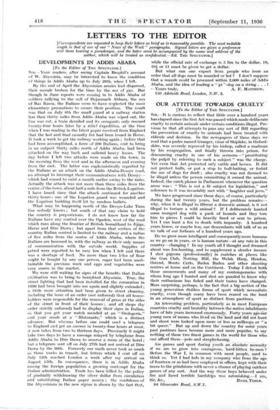OUR ATTITUDE TOWARDS CRUELTY.
[To the Editor of THE SPECTATOR.] SIR,—It is curious to reflect that little over a hundred years has elapsed since the first Act was passed which made deliberate cruelty to certain animals under certain conditions illegal. Pre- vious to that all attempts to pass any sort of Bill regarding the prevention of cruelty to animals had been treated with ridicule and derision. In the newspapers of those days we read that a padre named Granger, vicar of Shiplake, in Oxford- shire, was severely reproved by his bishop, called a madman by his congregation, and finally thrown into prison, for denouncing cruelty in one of his sermons —" prostituting the pulpit by referring to such a subject " was the charge. Yet even that Act protected only cattle and horses. It did not protect bulls, or put a stop to bull-baiting, or forbid the use of dogs for draft ; also cruelty was not deemed to be illegal unless the person committing it owned the animal. Indeed, the catch phrase in Parliament whenever the question arose was : " This is not a fit subject for legislation," and reference to it was invariably met with " laughter and jeers."
We have progressed since those days, of course, particularly during the last twenty years, but the problem remains— why, when it is illegal to illtreat a domestic animal, is it not illegal to torture a wild animal ? If I deliberately hunted some mongrel dog with a pack of hounds and they tore him to pieces I could be heavily fined or sent to prison. Yet I can hunt a fox to death with impunity. A hundred years hence, or maybe less, our descendants will talk of us as we talk of our forbears of a hundred years ago.
Do we grow more intelligent and consequently more humane as we go on in years, or is human nature—at any rate in this country—changing ? In my youth all I thought and dreamed about was fox-hunting, and to supplement a slender income I shot pigeons (professionally) in matches at places like the Gun Club, Notting Hill, the Welsh Harp, Hendon, Ostend, Monte Carlo, Baden Baden and other shooting centres at home and on the Continent. Today I detest both those amusements and many of my contemporaries with whom long ago I hunted and shot are puzzled to know why their enthusiasm has faded and their tastes have changed. More surprising, perhaps, is the fact that a big section of the young generation dislikes forms of sport which necessitate cruelty, even though many have been reared on the land
in an atmosphere of sport as distinct fthm pastimes. '
An interesting problem, particularly as in most European countries cruelty and brutality betvveen the native inhabitants have of late years increased enormously. Forty years ago our young men of means who lived on the land and-did not hunt and shoot were looked upon more or less as milksopi pr bit queer." But up and down the` country for some years past pastimes have become more and more popular, to say nothing of those two finest games in the world for those who
can afford them—polo and steeplechasing. . . . Are games and sport during youth an absolute necessity
if we are to grow into courageous, hard-bitten he-men ? Before the War I, in common with most people, used to think so. Yet I had lads in my company who from the age of fourteen or so had been employed in offiCes, kept with their noses to the grindstone with never a chance of playing outdoor games of any sort. And the way those boys behaved under fire and faced terrible hardships was astonishing.--I am,•












































 Previous page
Previous page